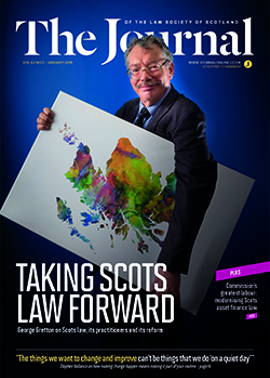Human trafficking from the defence perspective

I was aware of the Human Trafficking and Exploitation (Scotland) Act 2015 when it came into force. I wrongly assumed, however, that my likely involvement with it would be when defending an accused being prosecuted for allegedly breaching its provisions.
A number of weeks ago an assistant at our firm asked to speak to me regarding a Malaysian client we were representing on a charge of being concerned in the supply of controlled drugs. The offence involved bringing drugs into the country via a Scottish airport, where he was detained by police officers. The client was charged, appeared in court and was remanded in custody. He had made admissions during police interview and was caught in possession of the drugs at the airport. Instructions were taken from the client to resolve the case by an early plea of guilty in terms of s 76 of the Criminal Procedure (Scotland) Act 1995, to secure the maximum discount in relation to sentence.
The solicitor dealing with the case, however, became concerned. After his plea had been tendered, the client had been visited at HMP Edinburgh prior to deferred sentence. He stated that he had been the victim of human trafficking. Various details were provided as to the mechanism and manner in which this had taken place. This position was also provided to the social worker who was preparing the criminal justice social work report.
This was the first time the client had made this disclosure, and a decision had to be made as to what action to take, if any. The position he outlined, even taken at its highest, did not meet the high standard required to establish a special defence of coercion. However, the information provided was certainly concerning and at least represented significant mitigation.
The protection framework
Part 2 of the 2015 Act, however, provides protection for accused persons who are the victims of human trafficking. Section 8 places an obligation on the Lord Advocate to consider whether to prosecute a person for an offence committed in circumstances where they have been the victim of human trafficking.
Paragraph 11 of the Lord Advocate’s guidelines states: “The accused may have provided information to the police, a solicitor, a social worker, a representative of an NGO or any other person who has met with them, suggesting that they are a victim of human trafficking or exploitation and prosecutors must carefully consider the information regardless of its source. It is however important that the veracity of any claim by an accused person is properly tested.”
The guidelines further make it clear that this obligation on the Crown exists even post-conviction and that when such information comes to light, ongoing proceedings should be adjourned for suitable investigations to be completed. Ultimately a report should be presented to the national lead prosecutor, making an assessment as to whether, on the balance of probabilities, the accused was compelled to commit the offence in question and whether the compulsion was directly attributable to human trafficking and exploitation. Should this test be satisfied, a decision may be made to discontinue proceedings. In post-conviction cases an application can be made to the court under s 188 of the 1995 Act for the conviction to be set aside.
The position in Scotland differs from that in England, where s 45 of the Modern Slavery Act 2015 provides a defence to all offences committed in the course of being compelled by slavery or exploitation. It is a defence, however, that in practice may be difficult to establish, given that often the main source of evidence may be an accused person themselves. An accused’s legal representative can also lack the resources and intelligence sources which are available to the police.
Need for vigilance
Returning to the current case, contact was made with the procurator fiscal’s office prior to the deferred sentence and the information provided by the client was brought to their attention. A defence motion was made to the court that sentence should be further deferred for the Crown to make the appropriate investigations. The presiding sheriff took the view (quite correctly) that any motion to defer sentence further on this basis should be made by the Crown. The procurator fiscal depute in court stated that the Crown did not make this motion and the sheriff proceeded to sentence. The Crown has, however, undertaken to send a report containing all the provided information to an appropriate law officer for consideration and investigation.
What is clear, however, is that for the protection laid out in s 8 of the 2015 Act to be of practical use for accused persons who are the victims of exploitation, all stakeholders including defence solicitors must be vigilant and forthcoming with information and circumstances which trigger the Crown’s obligation to investigate an individual’s case.
It will be interesting to see the level to which this provision is exercised and assists in identifying and tackling the more subtle cases of human exploitation and abuse in Scotland.
In this issue
- Valuing loss of society: an elusive consistency
- Child maintenance: yet another DWP effort
- Trading futures
- Appeals and extracts: sticking to the rules
- Making the law work better (1)
- Reading for pleasure
- Opinion: Trish McLellan
- Book reviews
- Profile
- President's column
- 2018: keep up the momentum
- People on the move
- "One lifetime is not enough"
- Legally habit-forming
- Equality in service
- The Scottish draft Budget 2018-19: what happened?
- Legal software: has your supplier been bought out?
- Asset finance: time for reform
- Human trafficking from the defence perspective
- Contract law in flux
- The limits of appeal
- Attention media lawyers
- Disability: a new focus
- A tale of two Budgets
- System redesign
- 21st Century Bar rides again
- Scottish Solicitors' Discipline Tribunal
- Happy new year?
- Specialist accreditation scheme relaunches
- Public policy highlights
- Paralegal pointers
- Making the law work better
- At the cutting EDGE
- Confirmation declarations agreed
- Q & A corner
- Documents, data and the GDPR
- Ask Ash
- Appreciation: Ethel May Houston OBE






